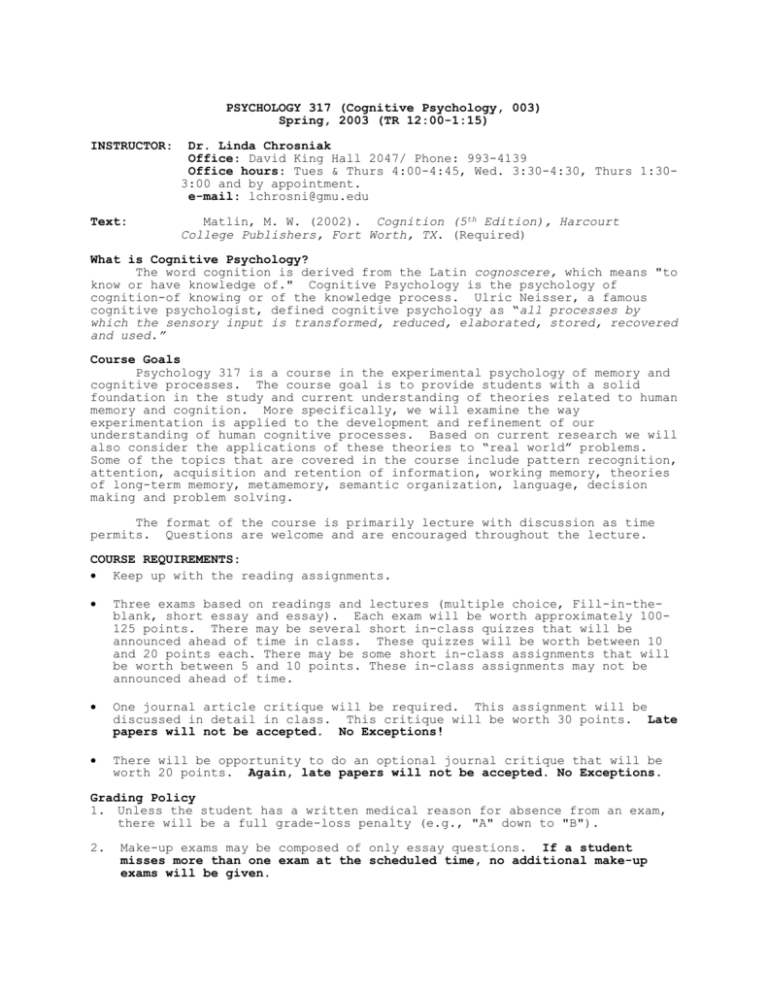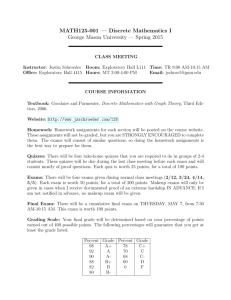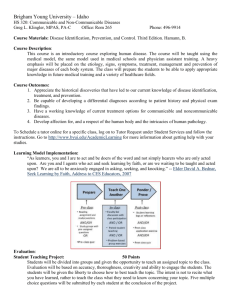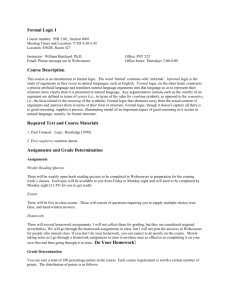PSYCHOLOGY 305/ MEMORY AND COGNITION
advertisement

PSYCHOLOGY 317 (Cognitive Psychology, 003) Spring, 2003 (TR 12:00-1:15) INSTRUCTOR: Dr. Linda Chrosniak Office: David King Hall 2047/ Phone: 993-4139 Office hours: Tues & Thurs 4:00-4:45, Wed. 3:30-4:30, Thurs 1:303:00 and by appointment. e-mail: lchrosni@gmu.edu Text: Matlin, M. W. (2002). Cognition (5th Edition), Harcourt College Publishers, Fort Worth, TX. (Required) What is Cognitive Psychology? The word cognition is derived from the Latin cognoscere, which means "to know or have knowledge of." Cognitive Psychology is the psychology of cognition-of knowing or of the knowledge process. Ulric Neisser, a famous cognitive psychologist, defined cognitive psychology as “all processes by which the sensory input is transformed, reduced, elaborated, stored, recovered and used.” Course Goals Psychology 317 is a course in the experimental psychology of memory and cognitive processes. The course goal is to provide students with a solid foundation in the study and current understanding of theories related to human memory and cognition. More specifically, we will examine the way experimentation is applied to the development and refinement of our understanding of human cognitive processes. Based on current research we will also consider the applications of these theories to “real world” problems. Some of the topics that are covered in the course include pattern recognition, attention, acquisition and retention of information, working memory, theories of long-term memory, metamemory, semantic organization, language, decision making and problem solving. The format of the course is primarily lecture with discussion as time permits. Questions are welcome and are encouraged throughout the lecture. COURSE REQUIREMENTS: Keep up with the reading assignments. Three exams based on readings and lectures (multiple choice, Fill-in-theblank, short essay and essay). Each exam will be worth approximately 100125 points. There may be several short in-class quizzes that will be announced ahead of time in class. These quizzes will be worth between 10 and 20 points each. There may be some short in-class assignments that will be worth between 5 and 10 points. These in-class assignments may not be announced ahead of time. One journal article critique will be required. This assignment will be discussed in detail in class. This critique will be worth 30 points. Late papers will not be accepted. No Exceptions! There will be opportunity to do an optional journal critique that will be worth 20 points. Again, late papers will not be accepted. No Exceptions. Grading Policy 1. Unless the student has a written medical reason for absence from an exam, there will be a full grade-loss penalty (e.g., "A" down to "B"). 2. Make-up exams may be composed of only essay questions. If a student misses more than one exam at the scheduled time, no additional make-up exams will be given. 3. In-class assignments and quizzes may not be made up under any circumstances. NO EXCEPTIONS! 4. In the case of borderline grades, consistency and direction of change may be taken into account. GRADES A minimum grade of C is required to receive credit for this course. In addition, the university has a grading system that allows for +s and -s. For example, a student with an 88% average in the course may receive a grade of B+ rather than a B in the course. Similarly, a student with an average of 90% may receive a grade of A- rather than a grade of A. Specifically, your grade in the course will be based on the total number of points earned on the exams, written assignments and quizzes. For example, if there are 400 possible points on the exams, written assignments, and quizzes and you earn 360 points (90%) during the semester you would be likely to receive a grade of A-. Or, if you earn 300 points (75%) you would receive a grade of C for the course. HONOR CODE: All exams, assignments and quizzes must follow the guidelines of the GMU Honor Code as described in the GMU catalog. Students may use books, notes, and other sources in preparing for exams, assignments, and quizzes. Other students may be consulted. However, when taking exams, quizzes or completing out-of-class assignments no books, notes, or student interaction will be allowed unless otherwise instructed. Please be sure that you are familiar with the Honor Code as described in the GMU catalog. INCOMPLETES: A grade of "Incomplete" may be assigned if a student is passing the course and is unable to complete the scheduled coursework for a cause that is beyond reasonable control. In such a case the instructor may assign a grade of “Incomplete” (IN). If a grade of "Incomplete" is assigned, the rule for completing course work is as follows: "The student must complete all the requirements by the end of the ninth week of the next semester, and the instructor must turn in the regular grade by the end of the tenth week... If the student fails to meet the foregoing schedule, the mark of IN is changed by the registrar to an F. ...The student is responsible for submitting work to the instructor with sufficient time for evaluation." It is the student's responsibility to contact the instructor regarding requirement for removing an "Incomplete" and the specific date by which the required assignments must be completed. ATTENDANCE: Class attendance is strongly recommended as course material will cover both the required readings and additional material presented in the lectures. If students are absent frequently, they will miss a significant amount of material. It has been my experience that regular attendance is positively correlated with mastery of the material and higher grades in the course. Additional Information: If you have a disability and require some accommodation, please see me as soon as possible. Course Outline* DATE TOPIC READINGS Jan 21 Intro to Cognitive Psychology/ Chapter 1 Jan 21-28 Perceptual Processes Sensation and Object Recognition Chapter 2 (pp. 32-48) Jan 30Feb 6 Perceptual Processes Attention Chapter 2 (pp. 51-71) Feb 11-13 Short-term Memory & Working Memory Chapter 3 Feb 18 Catch-up and Review Feb. 20 Exam 1 Feb 25Mar 6 Theories of Long-term Memory Mar 11 & 13 Spring Break - No Class Mar 18-20 Semantic Memory, Schemas and Scripts Chapter 7 Mar 25-27 Memory strategies and metacognition Chapter 5 Apr 1 Catch-up and Review Apr 3 Exam 2 Apr 8-10 Imagery Chapter 6 Apr 15-17 Language Chapter 9 Apr. 22-29 Problem Solving & Creativity Chapter 10 May 1 Catch-up and Review Chapter 4 May 13 Exam 3 (10:30 a.m.) ____________________________________________________________________________ * Any schedule changes (or changes in assignments) will be announced in class in advance. After an absence, students are responsible for contacting the instructor to obtain accurate information.








